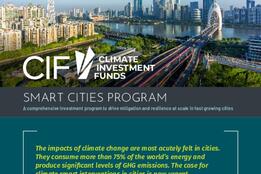WHAT IT AIMS TO ACHIEVE
The Smart Cities program aims to demonstrate a scalable and replicable climate-smart model of urban development that is coordinated, compact, and connected. It aims to help cities deliver a comprehensive investment program to drive mitigation and resilience at scale. It seeks to fill a gap in the landscape of relevant initiatives by focusing on delivering finance through a programmatic and participatory approach that leverages the Climate Investment Funds multi-MDB partnership platform.
The program will focus on fast-growing small and medium-sized cities. These cities have a population ranging in number from 100,000 to four million.
Why it’s needed
Cities are both a major culprit for climate crisis and a victim of its acute impacts. They consume more than 75% of the world’s energy and produce significant levels of GHG emissions while also being the hotspots of widespread, dangerous, and increasingly irreversible impacts of extreme heat, devastating floods and rising sea levels. And yet, cities account for 80 percent of the global gross domestic product and are centers of innovation. Therefore, cities are also the key to unlocking low-carbon and climate-resilient development.


How it works
The Smart Cities Program will work with cities in low- and middle- income countries to accelerate the transition to low-carbon, climate-resilient urbanization. It will support the development of climate-informed urban planning carried forward by strategic public and private investment. Robust data and tools for broad participation will guide decision-making, ensuring choices that align with green and sustainable development, and are buoyed by public buy-in.
The program intervention strategy has three main components:
- Rapid City Diagnostic — aims to identify and engage with beneficiary cities through an efficient instrument for assessing the cities’ current situation and projected trends. Specifically, the rapid city diagnostic assesses the cities’ exposure to climate risks; their current level of preparedness; and gaps to mainstreaming climate-related considerations into urban planning and investment pipeline development.
- Preparation of climate-informed strategic spatial planning and other climate action plans and project pipeline development — refers to the formulation of climate-informed spatial plans and other types of city-level climate action planning. These plans should be relevant to context-specific circumstances and needs; gender-responsive; and reflective of the outcomes of effective stakeholder engagement, including necessary interactions at the national level. This component also covers multi-year capital investment plans, with a focus on developing a project pipeline for implementation.
- Implementation of catalytic investment projects — focuses on financing and implementing key catalytic investment projects, as identified by cities. Priority will be given to strategically-aligned projects that are both ambitious and transformational, and where concessional climate finance is needed to overcome barriers to meaningfully achieve the program’s objectives.
Examples of projects, which the Smart Cities Program will support, include the following:
- Promoting non-motorized and electro mobility;
- Enhancing the use of renewable energy sources and increasing energy efficiency;
- Supporting resilient, green, and resource-efficient improvements in new and existing buildings;
- Reducing the energy footprint and improving the resilience of water supply and treatment systems;
- Promoting sustainable cooling approaches;
- Implementing integrated waste management and waste-to-energy solution; and
- Designing and building climate-resilient urban infrastructure systems.
Delivery Challenges
The design of the program takes into account the current challenges and opportunities of the urbanization trends in these cities, where the transformational impacts of climate-smart urbanization are expected to be most significant. These cities have substantial infrastructure deficits, creditworthiness and bankability challenges, and limited ability to attract private finance. The program thus offers an opportunity to pilot-test innovative technologies and financial instruments to contribute to the cities’ climate change needs.


